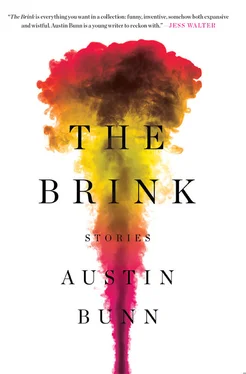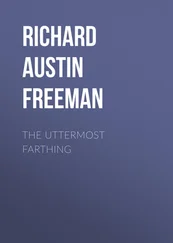He held up a hand that had the fingers fused together. “I ain’t never going to look like everybody else,” he said. “Neither will you.”
He banged his chair back to the ground so he could dig around in his pocket with his good hand. He found a blister pack of pills. No label or markings.
“How old are you?”
“Twenty-two,” I said.
He tossed the packet at me. “Take some of those.”
“What are they?”
“They’re not for you. They’re for her.”
“For who?”
“For the girl,” he said. “For the partner of your choosing.”
I shake my head and hand the pills back. “No thank you.”
He scratched at his cheek and considered what came next. “Listen to me. I’m doing you a favor. You’re broken now. Just like every person who comes through here. No woman is going to look at you. You’ll see. You’ve got lots of time, lots of time to see what I’m saying. The only kind of sex you’ll have, from here on out, is up in your head.”
He must have seen something shift in me. Because he tossed those pills right back.
The Star Mart, it figures, doesn’t have a bathroom. So I huddle by the magazine rack, crushing two pills against the shelf, Jess waiting in the car. I won’t miss this time. I pour the powder from my hand into the neck of a soda bottle and shake it. When I pay, the Indian at the counter gives me a look. Behind him, a bank of security camera feeds. There’s one over the magazine rack. He saw everything, says nothing.
Back in the car, I set the bottle between us. “Thirsty?” I say. “I got us a soda.”
“Let’s go somewhere,” she says, taking the bottle.
So I drive to the deserted Rutland Mid-City Mall. It’s been waiting for demolition for years. You can look in the windows and see rolls of carpet and dummies and florescent bulbs. In the acres of asphalt and lamplight, you feel like you’re parked on the moon. I used to come here and join up with a crowd of smokers on the backside, where we’d turned a patch of curb into our spot.
“This place is special for me,” I say. It was here that I met this beautiful girl, Melissa Carmichael, in a skirt and with a scarf on her wrist. Melissa was up from the Berkshires, the only one of us not getting stoned. I lay my head in her lap and told her about my favorite soundtracks. She combed my hair with her fingers and loved me in minutes. But then she had to go, she said, she was staying with a friend. “When can I see you? I have to see you,” I said, and she told me she would come back tomorrow tonight except Eric Denning found me that night and then I never saw her again.
“This is where I last felt like a person,” I say.
Jess blinks slowly, preparing to speak. “My brother wanted to draw comic books,” she says. “I kept all his drawings.”
She knows who I am. She peels the label off the bottle. Half of it’s already gone.
“Once I came to visit you in the hospital,” she says. “I was eleven. And I went by myself. I was so scared.” She smears the black eye shadow with the back of her hand. “They wouldn’t let me see you.” Her hand moves toward me, searching for mine. “I’m sorry.”
I flinch. “Don’t.”
Already, she’s going slack. I wonder how big a dose I put in there, how long she’s going to be out.
“I’m feeling sick,” she says.
Then she’s gone, pillowed against the door. Her chest rises and falls even and regular. Her breath frosts a white cloud on the window. Her cell phone rings. Someone’s looking for her. I undo my seatbelt. It takes some doing, but I press my head where it belongs, into her lap, into a warm invitation. I want to keep her like this for a long time.
Yes, Henry would like to say something.
In the early part of his marriage, Henry started an extension to the house that he never finished. Ten years and counting, conduit still sprouts from the ceiling. Pink ribs of insulation are just there. His wife, Margot, made him put in a twin bed to home it up. She was afraid their daughter Effie would go and electrocute herself, fork in socket, to a curly-haired cinder. But Effie didn’t go into the room, because she thought it was haunted, and in a way, it was. Eventually, there was this door they didn’t talk about and never went into.
Then, one morning this spring, Margot opened it. This was right after her test results came back negative, and she was all about new patterns. Like soy milk and morning Zumba and finishing the unfinished. She moved the bed to clean and Henry heard the crash of his magazines and videotapes. His body tensed in the magnifying quiet. At the state concert hall in New Brunswick, where he works as a stage manager, he’s heard a soloist’s violin crack and fold in from pressure. He’s seen the lighting grid come raining.
Irrevocable things happen all the time.
Henry rose and found her on the edge of mattress, leafing through his porn, his secret cache. Men in the photos, mouths and bodies penetrated on every page. At her feet, she’d made a neat stack of the videos, the sad lot of them, whose titles— Fuckbuds, Dungeon Cops, The Delights of Allan Twinkler —gave Henry’s shame a fresh edge.
“Just tell me,” Margot said, “did these do you any good?” And at that moment, before it got bad and then worse, while they still had their patterns (a little sun of grapefruit in the morning, a joint each month on date night), Henry was more in love with her than he’d ever been. Love like she was the last log of a splintering raft. Henry was, and still is, terrified.
Six months later, Margot’s therapist e-mails Henry’s therapist a link. “Dawn Manor,” the website reads. “When it’s time to get found.” On the website, a group of men sling their arms over each other like a softball team. Honestly, Henry prefers a little more space between people. This manor, a big Victorian in the Catskills, is a kind of workshop for “men who love men” but are bent out of shape about it. Henry can’t find anybody close to his age in the photos, but he never sees people his age in advertisements unless they’re for pills or Florida. On the “Who We Are” page, in a portrait staged with professional light, two men with identical goatees press their heads together with a golden retriever between them. “Dawn Manor is operated by author/certified intuitive Bodi Charles,” the caption reads, “and his husband Spike and dog Rigby.”
“His husband,” Henry says to himself, trying it out, and decides it sounds absurd. At fifty-three-years-old, with readers and a disconcertingly white thatch of hair on his chest, he’ll be lucky to land a fuckbud. Now that his secret life, furtive visits to the Lion’s Den adult bookstore, terrified opportunism in public restrooms, has become his actual one, he sees he has chosen to die horny and alone.
Tonight, his best friend Van, the sound engineer at the concert hall, is coming over to “christen the escape pod,” he said. They’ve been friends for years, and lovers in Henry’s mind for nearly as long. At work, the production crew calls Van “the Pirate” on account of his hoop earring and his grizzle along the jaw; the nickname alone brings Henry’s cheery erection out of early retirement. Van wears construction boots with the laces so loose they’re really flip-flops. Everything he keeps on him — wallet, watch, Leatherman — is hitched to his belt with metal links, so none of his needs can get too far from him. Van is just about forty and newly divorced. His son visits on weekends. Henry is lonely enough not to care that he’s in love with a straight man.
“I like the Christmas lights,” Van says on arrival, taking in the studio. “Very bachelor Noël.”
Van wears a blazer and a cap that reads “VOLUNTEER” across the front; this visit, it occurs to Henry, may be a form of community service. Under his arm, Van carries a radio with a broken antennae that “gets angry” if you play with it too much. “From my divorce to yours ,” Van says, leaning back in the other chair.
Читать дальше











